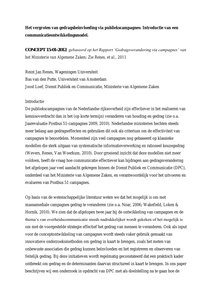Orthography is considered to be a major problem in Dutch education, since many pupils don’t seem to be able to master orthographic rules, even after years of education. In educational literature it is argued that the problems related to spelling are caused by approaches that focus more on rules of thumb than on linguistic insights. This is somewhat remarkable, since a good understanding of the Dutch orthographic system requires a fair amount of morphological knowledge. In order to effectively implement this knowledge, the development of a morphological awareness (MA) seems to be required. Therefore, a short intervention was designed for the upper levels of secondary schools (4 havo) which aimed to foster MA and, subsequently, improve orthographic skills. Results of this quasi-experimental study indicate that a short intervention can significantly boost MA, but that students don’t seem to be able to use MA effectively to enhance spelling performance.

Increasingly, education is delivered through computers and the internet. This article highlights that while such development is beneficial for some students with functional impairments, it might be excluding others if insufficient attention is paid to accessibility. Both the electronic learning environment (Blackboard, WebCT and the like) as well as the content author need to design for accessibility.

CONCEPT 15-01-2012: gebaseerd op het Rapport ‘Gedragsverandering via campagnes’ van het Ministerie van Algemene Zaken; Zie Renes, et al., 2011 De publiekscampagnes van de Nederlandse rijksoverheid zijn effectiever in het realiseren van kennisoverdracht dan in het (op korte termijn) veranderen van houding en gedrag (zie o.a. Jaarevaluatie Postbus 51-campagnes 2009, 2010). Nederlandse ministeries hechten steeds meer belang aan gedragseffecten en gebruiken dit ook als criterium om de effectiviteit van campagnes te beoordelen. Momenteel zijn veel campagnes nog gebaseerd op klassieke modellen die sterk uitgaan van systematische informatieverwerking en rationeel keuzegedrag (Wevers, Renes, Van Woerkum, 2010). Door groeiend inzicht dat deze modellen niet meer voldoen, heeft de vraag hoe communicatie effectiever kan bijdragen aan gedragsverandering het afgelopen jaar veel aandacht gekregen binnen de Dienst Publiek en Communicatie (DPC), onderdeel van het Ministerie van Algemene Zaken, en verantwoordelijk voor het uitvoeren en evalueren van Postbus 51 campagnes.
